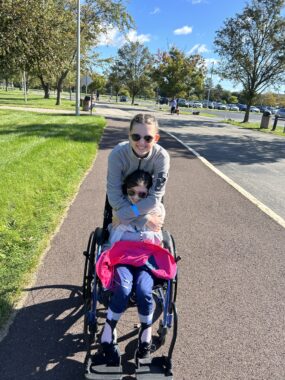Reclaiming the daughter FA put on the back burner
Parenting in an FA family can often feel like a balancing act
Written by |

I have always loved children. This feeling has been woven into so much of my life and career. When I found out that we were expecting our eldest, I bought onesies and hung them up around the entrance to our home. When my husband came home, I held up one that said, “I love my daddy” and smiled. In turn, he almost dropped the bags he was carrying. We were thrilled.
We have two children, and though this column usually focuses on the care of our youngest, who is 12 and has Friedreich’s ataxia (FA), I want to talk about the teen who does not have the diagnosis, our incredible Katherine.
As anyone in our community can tell you, FA is a family disease, meaning that it doesn’t just run in the family with genetics, it also runs through the family with its impact. Amelia has the diagnosis, but Katherine is affected by it differently.
As a family, we all pitch in to help support Amelia. We think about accessibility when we travel or what resources we need and can commit based on how this disease is playing out in our lives. This leaves me sometimes feeling like Katherine is hanging out on the back burner of life as I manage a kitchen that sometimes feels like it is on fire.
Recalibrating
I want to take a moment here to talk about parental guilt. I’ve heard so many dedicated parents talk about wishing they had done more for their children, but very few of them were managing a progressive and degenerative disease. When FA rolls into the picture, this feeling can be overwhelming. Allowing my guilt or self-doubt to hang around me like a heavy fog doesn’t help me live my best life or be the mom I want to be. In fact, it does the opposite.

Sisters Katherine, standing, and Amelia Hamilton participate in a rideATAXIA event in Philadelphia, in October 2023. (Photo by Elizabeth Hamilton)
Lately, I’ve been working on embracing the fact that I’m not always going to get it right when it comes to parenting. Sometimes I do an incredible job paying attention to the new thing that Katherine loves or the passion she has developed. Watching her favorite TV show with her or noticing the new jewelry she has creatively made is so important. Other times, I will be more focused on the demands FA makes on our family. I repeatedly recalibrate my focus, my views, and my energy because that is what this life demands.
Observing Katherine recently, I’ve noticed how FA has changed her mobility. She is quick to reach out a hand to steady her sister. She plants her feet firmly when they are together so she can support Amelia when needed. Where FA is stealing the physical balance of one child, it has brought steadiness to another.
I see Katherine becoming more mindful, sympathetic, and aware. She looks at layouts for paths Amelia can safely take and advocates for her sister with a fierce but collaborative voice. In all of it, she brings some humor and an infectious laugh that gives her sister strength.
I thought Katherine was amazing from the first time I held her in my arms, and that belief has only continued to grow.
Note: Friedreich’s Ataxia News is strictly a news and information website about the disease. It does not provide medical advice, diagnosis, or treatment. This content is not intended to be a substitute for professional medical advice, diagnosis, or treatment. Always seek the advice of your physician or another qualified health provider with any questions you may have regarding a medical condition. Never disregard professional medical advice or delay in seeking it because of something you have read on this website. The opinions expressed in this column are not those of Friedreich’s Ataxia News or its parent company, Bionews, and are intended to spark discussion about issues pertaining to Friedreich’s ataxia.




Leave a comment
Fill in the required fields to post. Your email address will not be published.